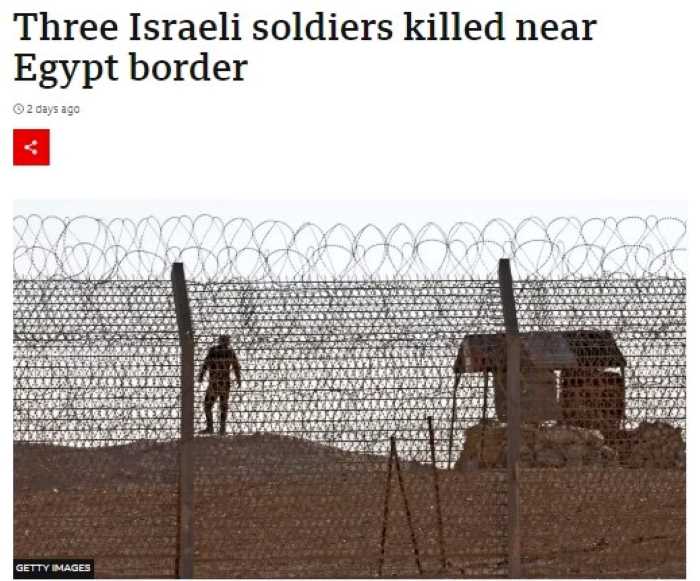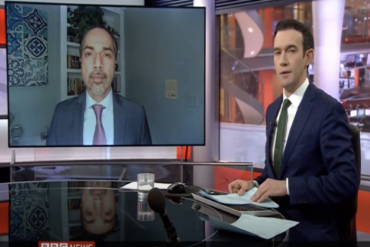On the morning of June 3rd a serious security incident took place in the region near Israel’s border with Egypt.
“An Egyptian policeman shot and killed two Israeli soldiers who were manning a guard post near the border on Saturday morning, the military said. The Israel Defense Forces said there was a further exchange of fire in the area hours later, inside Israeli territory, in which the gunman and another IDF soldier were killed.
The incidents occurred between Mount Sagi and Mount Harif in the Negev desert. The circumstances were under investigation by the military, including how the gunman, an Egyptian policeman, managed to infiltrate Israel from Egypt. […]
The troops killed in the initial attack were named as Sgt. Lia Ben Nun, 19, from the central city of Rishon Lezion, and Staff Sgt. Ori Yitzhak Iluz, 20, from the northern city of Safed. The soldier killed in the later clash with the gunman was named as Staff Sgt. Ohad Dahan, 20, from the southern city of Ofakim.
Iluz and Ben Nun served as combat soldiers in the Bardelas Battalion. Dahan served in the Caracal Battalion. Both units are tasked with guarding the Egyptian border.”
The BBC News website published a report by the Jerusalem bureau’s Yolande Knell on the evening of June 3rd under the headline “Three Israeli soldiers killed near Egypt border”.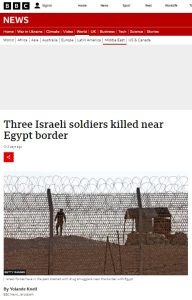
Readers are told that:
“Egypt says its officer crossed into Israel while chasing drug traffickers. […]
In a vaguely worded statement, the Egyptian military said that its security officer was pursuing drug smugglers and that a shooting led to the Israeli deaths.”
Already on the morning of June 3rd it was known that the earlier incident involving drug smugglers had begun at around 2:30 a.m and that the Egyptian policeman had infiltrated Israeli territory sometime after six o’clock in the morning:
“On Saturday morning, hours before the first gunfire incident, IDF troops foiled an attempt to smuggle drugs over the border, seizing contraband with an estimated value of NIS 1.5 million ($400,000), according to military officials.
[IDF Spokesman] Hagari said the IDF did not know how to link the smuggling attempt at around 2:30 a.m., some 3 kilometers (1.8 miles) north of the military post which was attacked, to the deadly incident there four or five hours later.”
Knell’s report does not question the Egyptian version of events according to which, curiously, just one Egyptian policeman was “pursuing drug smugglers” on his own.
As the investigation into the incident progressed, more details became clear. On the morning of June 5th the Times of Israel reported that:
“Ben Nun and Iluz had begun a 12-hour shift together at 9 p.m. on Friday night at the military post on the Egyptian border. At around 2:30 a.m., troops foiled an attempt to smuggle drugs over the border, around three kilometers (1.8 miles) north of Ben Nun and Iluz’s position, seizing contraband with an estimated value of NIS 1.5 million ($400,000).
At 3 a.m., the smuggling incident was wrapped up; and at 4:15 a.m., troops radioed in to the guard post where Ben Nun and Iluz were located, who responded that everything was okay. […]
The Egyptian policeman was believed to have snuck up to the guard post and opened fire sometime between 6 and 7 a.m., killing Ben Nun and Iluz.”
Late on the evening of June 5th the BBC News website published another report on the same story under the headline “Israel returns body of Egyptian policeman who killed Israeli soldiers”. That report by David Gritten again promotes the official Egyptian framing of events which, by the time it was published, was known not to be an accurate account of what happened.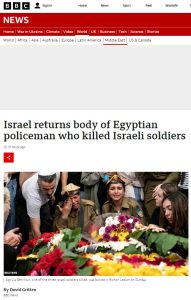
“Egypt said after the incident that he crossed into Israel while chasing drug smugglers, leading to an exchange of fire with the Israeli soldiers.”
Gritten goes on to present other accounts of the incident sourced from the Israeli media in what therefore amounts to a ‘he said-she said’ portrayal of the story rather than provision of the known facts to readers. No explanation is provided to BBC audiences concerning the reasons for the framing that the Egyptian authorities chose to present.
Gritten ends his report with promotion of hearsay:
“Egyptian authorities have not commented on the reports or confirmed the policeman’s identity, but a relative of Mohammed Salah and a member of his unit told BBC News Arabic on Monday that members of this family and friends were being detained for questioning by investigators.
The relative denied that Salah had been radicalised and suggested that he might have wanted to avenge the death of a comrade.
During a period of leave last month, Salah had expressed his anger about “the silence over the killing of one of his military friends by Israeli soldiers during his military service at the border”, they said. He had also complained about the military rejecting a request for a medical exemption, they added.
It is not known what alleged incident the relative was referring to.” [emphasis added]
One may well wonder why Gritten chose to amplify a second-hand story from an unidentified “relative” about one of the attacker’s “military friends” having supposedly been killed by Israeli soldiers if he had to admit in the next sentence that he has no knowledge of such an incident.
A short item posted in the updates section of the BBC News website’s ‘Middle East’ page some five hours before the appearance of Gritten’s report refers to “the death of a fellow soldier” but does not claim that Israeli troops were involved.
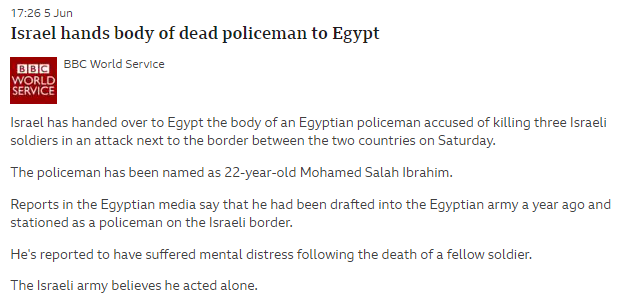
Quoting a report from Israel’s Kan 11 which translates claims made in the Egyptian media, the Times of Israel noted that:
“An Egyptian policeman accused of killing three Israeli soldiers in an attack on the border on Saturday morning was named Monday as Mohamed Salah Ibrahim, 22, from Cairo.
According to Arabic-language media reports, Ibrahim was drafted into the Egyptian army in June 2022 and stationed on the Israel border as a policeman. He was reportedly set to end his service in the near future.
Egyptian reports cited by Israel’s Kan public broadcaster said Ibrahim had complained several times about his military service, including recently, and had gone absent without leave for 18 days at one point.
The reports said Ibrahim had suffered mental distress following the death of a comrade and felt the issue had not been taken seriously. One of Ibrahim’s friends claimed he was trying to get a medical exemption from his service due to physical problems, according to the reports cited by Kan.”
BBC News website audiences, however, were told an unsubstantiated story about “the killing of one of his military friends by Israeli soldiers during his military service at the border” which Gritten himself admits cannot be confirmed.
Quite how such reporting conforms with the BBC’s recent pledge to “address the growing threat of disinformation and build trust with audiences by transparently showing how BBC journalists know the information they are reporting” is patently unclear.
Related Articles:
REPORT ON THE TERROR ATTACK NEAR KEREM SHALOM, AUGUST 5TH 2012

